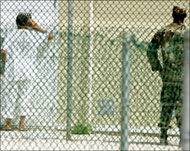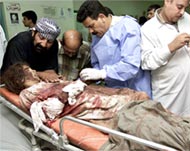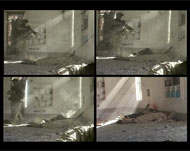What constitutes a legitimate target?
If truth is the first casualty of war, the second victim – in modern warfare at least – must be the distinction between combatants and civilians.

More than 50 years after the Geneva Conventions were drawn up to delimit the boundaries of warfare the arguments are still raging as to what constitutes a legitimate target.
And nowhere have the divisions been more acutely exposed than in the continuing “war on terror” where near daily atrocities have injected fresh urgency into the search for a consensus.
“There is agreement that the person who puts the bomb cartridge in the launcher is a combatant,” said Professor Louise Doswald-Beck, an authority on the law of armed conflicts who is participating in ongoing consultations on the subject headed by the International Committee of the Red Cross.
“But there is a division of views on the status of the person who delivers the cartridge to the military. And there is a general feeling that a person who manufactures the cartridge is not taking direct part in hostilities.”
With no agreement, the middle ground has proved ripe for exploitation.
In 2003, Pakistan arrested Taliban press spokesman Mulla Abd al-Salam Zaeef and handed him over to US custody. He is now in the Guantanamo Bay detention facility even though it was never suggested he performed a combat role.
Mulla Zaeef is just one example. Increasingly many jobs that were once performed by soldiers are being farmed out to the private sector with the result that more civilians are now supporting armed forces in roles such as drivers, engineers and translators.
 |
|
The status of arms manufacturers |
This is a huge grey area in the Geneva Conventions, which deems combatants as simply those taking part in “direct hostilities”. There is little agreement on the definition.
Definition difficulties
Humanitarian groups such as the ICRC are fighting for a tight meaning against the widening tendencies of state practice.
“Even if civilians (eg contractors) are increasingly ‘helping’ the armies, it would depend what tasks they fulfil to determine whether their task can be considered a direct participation to the hostilities or not and consequently, whether they are considered protected as civilians or not,” said spokeswoman Antonella Notari.
“The ICRC is convinced that it is a slippery slope to engage in if one starts to widen the definition of direct participation.”
States, meanwhile, have maintained that direct participation not only includes activities involving the delivery of violence, but also acts aimed at protecting personnel, infrastructure or material, and includes some supporting civilian tasks.
Changing warfare
Like other recent conflicts, the “war on terror” has strained legal and moral boundaries set for belligerents after the second world war by the Geneva Conventions, a function partly of the changed nature of war.
In the days when major wars were fought by armies squaring up on battlefields, as in the first world war, the proportion of civilian to combatant deaths stood at one to one.
 |
|
The US term “enemy combatant” |
By the second world war it had reached 1:10, a ratio which has remained at least as high in the current Iraq war and, according to the most recent independent study, may be many times higher.
In the second world war both the Allies and the Axis powers defended blitzes on each other’s cities on the grounds that weapons manufacturing and ancillary industries were sited there.
Today similar justifications are used for strikes by Israeli and US forces on targets in urban areas. They accuse Iraqi and Palestinian resistance fighters of using the relative sanctuary of civilian centres to offset some of their disadvantage in technology and equipment.
Proportionality
For human rights groups this widening of the target represents a direct attack on a key article of the Geneva Conventions.
“The principle of proportionality says that it is illegal to initiate an attack if the damage to civilians is excessive in relation to the military advantage gained,” explained Yehezkel Leim of the Israeli human rights organisation B’tselem.
“In theory, it is defined clearly but in practice it is difficult to find a clear-cut way of applying it,” added Leim whose organisation has petitioned Israel’s High Court of Justice to rule whether the Israeli army should open investigations into all cases where Palestinians have been killed outside combat.
The requirement is clear enough but the trouble is that its interpretation is usually a matter for armed forces in the field and ethical determinations can only occur after the “collateral damage” has been done.
 |
|
In law, if not in practice, civilians |
According to cameraman Kevin Sites who filmed the shooting of an unarmed and incapacitated Iraqi in a Falluja mosque during the latest US onslaught on the city, marines were “operating with liberal rules of engagement”.
Describing the US operation, Sites wrote on his blog site:
“‘Everything to the west is weapons free,’ radios Staff Sgt. Sam Mortimer of Seattle, Washington. Weapons Free means the marines can shoot whatever they see – it’s all considered hostile.”
According to another, unnamed, journalist ’embedded with US forces, the order came down on the eve of the Falluja offensive that troops could shoot any male on the street between the ages of 15 and 50 if they were viewed as a security threat, regardless of whether they had a weapon.
When marines asked a gunnery sergeant for clarification, he told his men if they saw any military-aged males on the street “Drop ’em.”
The consequences of this type of non-compliance with international norms can be dramatic. In the holy land the apparent failure to make a clean distinction between combatant and civilian has led to a downward ethical spiral.
In response to what they consider attacks against their civilian infrastructure and civilians, Palestinian resistance groups justify their gruesome reprisals by arguing that they too should not be expected to respect ethical differences.
New developments
Worryingly, it is practice, not international law, that appears to have the upper hand, a fact underscored by the emergence of the classification “enemy combatant” to describe irregular fighters.
|
“Enemy combatant is unknown to international law. It is an invented term. And the thing about inventing terms is that you can make them mean pretty much what you like” Professor Francoise Hampson, legal expert |
Mulla Zaeef is one of hundreds of people still detained by the US as “enemy combatants”, even though the category is not recognised by international law, according to Professor Francoise Hampson, another top legal expert based in the UK.
“The US is trying to have it both ways. It’s saying because they aren’t combatants we don’t have to treat them legally as combatants and because they’re not real civilians we don’t need to treat them as civilians,” she told Aljazeera.
Under international law, accepting that people are civilians grants them immunity from attack. Conversely seeing them as belligerents confers upon them certain rights including POW status if captured.
By denying either status countries including the US – the same stance has long been taken by Israel in its conflict with the Palestinian resistance groups – are effectively sidestepping international law and unilaterally drawing up new conventions.
Unilateral lawmaking
“Enemy combatant is unknown to international law. It is an invented term,” according to Hampson. “And the thing about inventing terms is that you can make them mean pretty much what you like.”
Their divergent path is taking the US and Israel further away from the international community. Efforts to establish a permanent international tribunal at which individuals can be held accountable for violating the sanctity of innocents have been undermined by the refusal of both countries to sign up.
 |
|
Cameraman Kevin Sites caught |
The US and Israel both justify their opposition on the grounds that opting in will subject their citizens to vexatious litigation but critics say it is a cynical ploy to prevent them from ever being hauled up to face the music.
To further frustrate the work of the court, Washington is signing bilateral “immunity agreements” with states to exempt US nationals from the jurisdiction of the International Criminal Court.
Human Rights Watch has criticised the strategy saying it will lead to “a two-tiered rule of law for the most serious international crimes: one that applies to US nationals; another that applies to the rest of the world’s citizens”.
Ultimately, according to critics, including Barbara Olshansky of the New York-based Centre for Constitutional Rights, the stance may also be endangering US citizens by giving its enemies an excuse to do likewise.
“What people in the United States haven’t realised is that if we don’t comply with them [the Geneva Conventions], no other country is required to comply with them, looking at our example,” Olshansky said. “That places our own soldiers at risk whenever they are fighting abroad.”